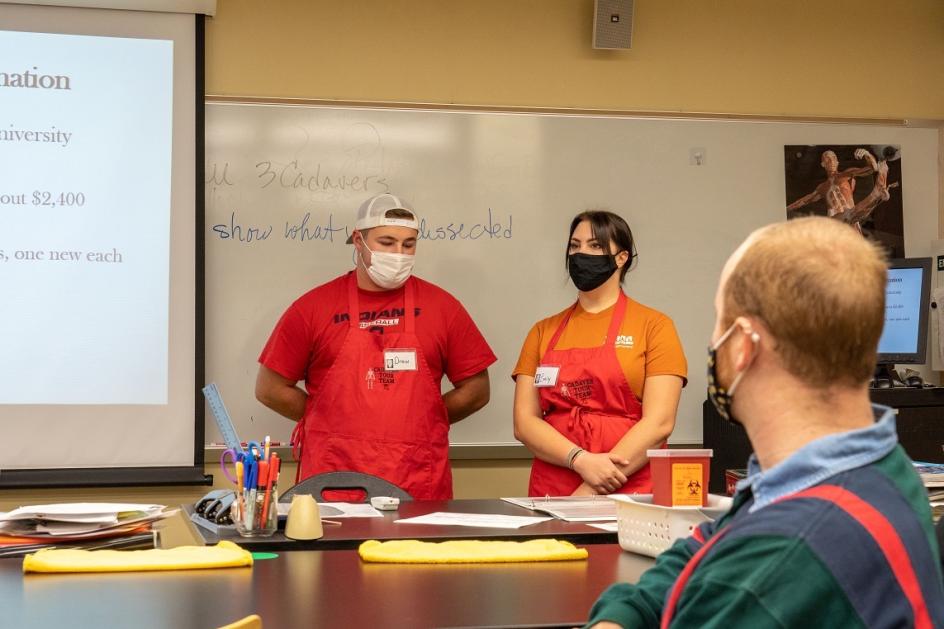
When visitors are getting ready to tour Heidelberg’s Body Donor Lab, the student Tour Team often helps them paint a picture in their mind’s eye about what they are about to encounter.
One group of ‘Berg staff members took it a step further last week when they were given an opportunity to tour the lab. Several members of the Enrollment & Marketing Division got a first-hand look at what students experience in the lab.
“This was a great opportunity to see the Cadaver Lab so that we can better explain it to prospective students,” said Assistant Director of Admission Katie Mullins, who worked with the Tour Team to organize the event. “We also really enjoyed getting to talk to the two current students about their unique experiences.”
Students enrolled in biology professor Dr. Pam Faber’s 400-level Cadaver Prosection course complete a service component to the course. Working in pairs, the students provide tours that are appropriately educational, Pam explained.
The majority of the tour audiences are students in BIO 110, 121 and 123 courses. As a follow-up to the completion of their fetal pig dissection in the labs, those students are given the opportunity to tour the lab.
“In those labs, typically over 4 weeks or so, they learn basic mammalian anatomy by dissecting a fetal pig. After their exam over this material, we offer tours to those who would like to better understand human anatomy,” she said.
Others on campus have taken advantage of the opportunity too.
Additionally this semester, Dr. Heleana Thexios brought her Bioethics students to the lab, where Pam discussed with them ethical treatment and use of donor bodies. Some of Heleana’s students then joined the bio students for tours. The Tour Team typically also hosts a tour for Dr. Carol Dusdieker’s Vocal Pedagogy class to review the anatomy of breathing and the voice box region.
Come tour time, the Tour Team looks professional in their red lab aprons. After giving a tour or two, they’ve settled in and it becomes like second nature. The students use PowerPoint slides to prepare their audiences before actually viewing the donor bodies. “I tell them to paint a picture of what their visitors will see before they see it,” Pam said.
As part of the preparation, visitors learn about the process of acquiring the donor bodies from The Ohio State University. At any given time, Heidelberg’s lab has three on loan; the one that has been with us the longest is rotated out each summer so a new individual can be brought in for fall semester. Upon return to OSU, the remains are then cremated.
“We learned how each donor is denoted by a number and no name is associated or given to any of them out of respect and to keep their identities anonymous,” said ’Berg graphic designer Lexi Fodor, who participated in the Enrollment & Marketing tour. Also shared is info about each donor’s age upon death, gender, underlying health conditions, cause of death and significant surgeries they may have had.
In preparation to give tours, the Cadaver Prosection students also are trained in safety issues, like what to do if someone feels light-headed or passes out. In all the years Pam has supervised tours, that’s only happened once.
During a typical year, students conduct about a dozen tours. On average, about 100-150 people tour the lab on an annual basis.
“We just want to share this exceptional educational resource with appropriate students and staff,” Pam said.
----------
We would like to thank all those who generously donated their bodies through the Body Donation Program at The Ohio State University. Without them, we would not be able to offer such a strong anatomical curriculum.